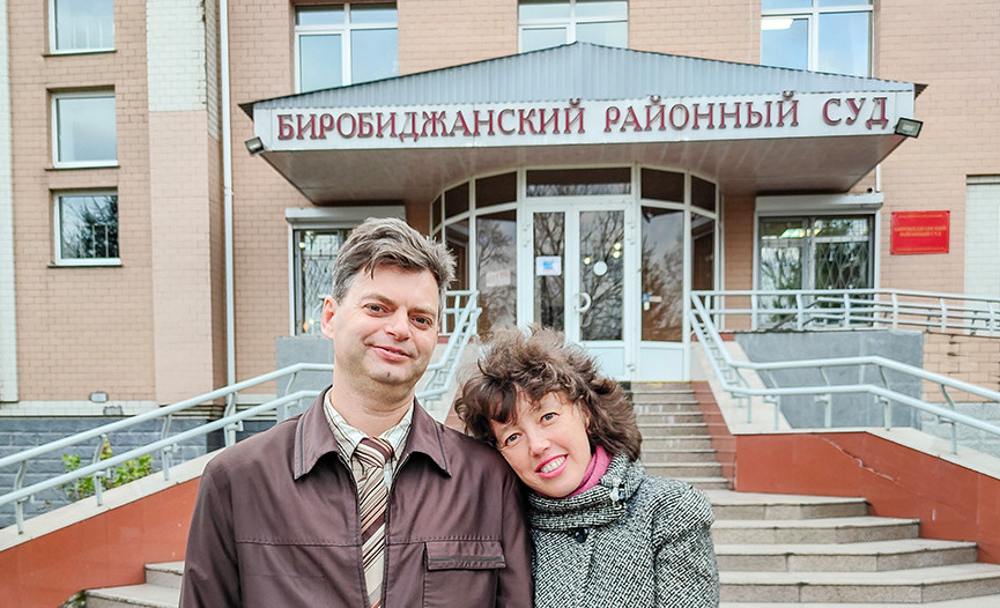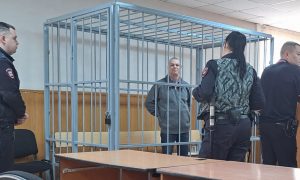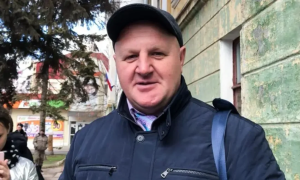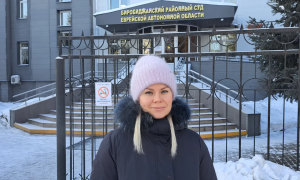Eight of nine Jehovah’s Witnesses convicted on extremism-related charges in two trials in Russia’s Far East in December 2022 received jail terms of 6 to 7 years. An Amur Region Prosecutor’s Office official justified the jailings: “Any missionary activity of members of a religious organisation liquidated by a court in connection with repeated violations of the law on countering extremist activity will be illegal in nature and subject to liability established by law.” The 9 were among 124 Jehovah’s Witnesses criminally convicted in 2022. Trials continue.

In two trials in mid-December 2022, two courts in Russia’s Far East sentenced a total of 9 Jehovah’s Witnesses to long jail terms. All but one received jail terms of between 6 and 7 years. The 9 men were among 19 Jehovah’s Witnesses to receive general-regime prison terms in the last quarter of 2022.
Raids, prosecutions, and convictions of Jehovah’s Witnesses for practising their faith in Russia continued unabated in 2022, despite the issuance in late 2021 of amended guidance for judges in extremism-related cases.
Across the calendar year, there were 124 convictions in first-instance courts, according to statistics from the European Association of Jehovah’s Witnesses (a small number were later overturned on appeal and sent back to prosecutors or for re-trial). The number of convictions has risen every year since prosecutions began in 2018, in the wake of the nationwide ban on Jehovah’s Witness activities.
In Birobidzhan, capital of the Jewish Autonomous Region, which has seen one of the highest numbers of prosecutions in the country, the district court handed two men 7-year sentences and their two fellow defendants terms of 6-and-a-half years and 3-and-a-half years respectively, all followed by lengthy periods of restrictions and bans on particular activities (see below).
In his final speech, Valery Kriger – jailed for 7 years – told the court that “although the prosecution states that I participated in organising [the activities] of the Local Religious Organisation of Jehovah’s Witnesses in the city of Birobidzhan, in fact it all boiled down to the fact that I, along with fellow believers, read the Bible, prayed, and sang religious songs” (see below).
Forum 18 asked Birobidzhan District Court why such long prison terms had been sought and imposed to punish the exercise of freedom of religion or belief, why – in light of the Supreme Court’s amended guidance that exercising freedom of religion or belief is not in itself grounds for prosecution – the men had been convicted, and in what way they could be considered dangerous. Irina Belousova, acting chair of the Court, responded that “judges are not obliged to give any explanation of the merits of cases, considered or pending” (see below).
Another five men received sentences of over 6 years each in Blagoveshchensk, capital of the Amur Region, another region where Jehovah’s Witnesses have been particularly heavily targeted. Two of the men’s wives also face criminal cases (see below).
In his final speech, Sergey Afanasyev – jailed for 6 years and 6 months – told the court that “I am well aware that I am being judged for my faith. If I weren’t a Jehovah’s Witness, I wouldn’t be in the dock now” (see below).
Roman Korolyov of the Amur Region Prosecutor’s Office justified the jailing of the five Jehovah’s Witnesses. “Any missionary activity of members of a religious organisation liquidated by a court in connection with repeated violations of the law on countering extremist activity will be illegal in nature and subject to liability established by law,” he told Forum 18 (see below).
Muslims who meet to read the works of the late Turkish Muslim theologian Said Nursi similarly face prosecutions on “extremism” charges. Six men are on trial in Moscow, three men in Naberezhnyye Chelny and three men in Kazan (see below).
Russia is also imposing long jail terms on Jehovah’s Witnesses in occupied Crimea and appears to be extending such punishments to other occupied areas of Ukraine.
48 Jehovah’s Witnesses sentenced to imprisonment in 2022
In 2022 as a whole, 48 Jehovah’s Witnesses were sentenced to imprisonment, while 63 received suspended sentences, 12 fines, and one man a sentence of corrective labour.
The number of Jehovah’s Witnesses simultaneously behind bars (in prison camps after conviction and in detention centres during investigation and trial) passed 100 for the first time in 2022 (this figure stood at 115 as of 23 December 2022, including nineteen over-60s, according to the European Association of Jehovah’s Witnesses).
2022 also saw the European Court of Human Rights (ECtHR) in Strasbourg rule that the liquidation of the Jehovah’s Witness Administrative Centre and its subsidiary organisations and the prohibition of their activities as “extremist” in 2017 were unlawful. The Russian government decided in July 2022, however, to withdraw from the Council of Europe and hence the jurisdiction of the ECtHR, backdating the application of this decision to March 2022; it will not, therefore, release or acquit any Jehovah’s Witnesses or pay any compensation on the basis of the ECtHR’s judgement.
The Supreme Court’s guidelines for extremism-related cases, updated in October 2021, direct judges to ascertain a defendant’s “specific actions”, their motivation, and “the significance [of these actions] for the continuation or resumption of a [banned organisation]’s activities”. The amendments also note that a person’s actions “consisting solely of the exercise of their right to freedom of conscience and freedom of religion .. do not in themselves constitute a crime under Article 282.2, Part 2, if they do not contain signs of extremism”. So far, this has had only a limited impact on sentencing.
Prosecutions of Jehovah’s Witnesses have continued into 2023 – January has already seen the imposition of two six-year suspended sentences (on 12 January under Criminal Code Article 282.2, Part 1, in the first conviction in the Tyva Republic – and on 17 January in Nizhny Novgorod, also under Article 282.2, Part 1).
Possible punishments
Jehovah’s Witnesses and Muslims who meet to read the works of the late Turkish Muslim theologian Said Nursi are prosecuted under Criminal Code Article 282.2, Part 1 or Part 2 (“Organisation of” or “Participation in the activity of a social or religious association or other organisation in relation to which a court has adopted a decision legally in force on liquidation or ban on the activity in connection with the carrying out of extremist activity”).
These offences carry the following punishments:
Criminal Code Article 282.2, Part 1 – six to 10 years’ imprisonment, plus a compulsory ban on holding certain positions and/or carrying out certain activities for up to 10 years and compulsory restrictions on freedom for one to two years after release; or a 400,000 to 800,000 Rouble fine;
Criminal Code Article 282.2, Part 2 – two to six years’ imprisonment, plus a possible ban on holding certain positions and/or carrying out certain activities for up to five years and compulsory restrictions on freedom for up to one year after release; or a 300,000 to 600,000 Rouble fine; or one to four years’ assigned labour, plus a possible ban on holding certain positions and/or carrying out certain activities for up to three years and compulsory restrictions on freedom for up to one year.
Some Jehovah’s Witnesses have also faced charges under Criminal Code Article 282.2, Part 1.1 (“Inclination, recruitment or other involvement of a person in an extremist organisation”) or Article 282.3, Part 1 (“Financing extremist activity”). These carry the following possible punishments:
Criminal Code Article 282.2, Part 1.1 – four to eight years’ imprisonment; or a 300,000 to 700,000 Rouble fine; or two to five years’ assigned work, plus a possible ban on holding certain positions and/or carrying out certain activities for up to three years;
Criminal Code Article 282.3, Part 1 – three to eight years’ imprisonment; or a 300,000 to 700,000 Rouble fine; or one to four years’ assigned work, plus a possible ban on holding certain positions and/or carrying out certain activities for up to three years.
The state of “sudimost” (having an active criminal record, the state of being a convicted person) also brings with it post-sentence formal penalties and informal obstacles to life.
Almost all those investigated or convicted on extremism-related charges are placed on the Federal Financial Monitoring Service (Rosfinmonitoring) “List of Terrorists and Extremists”. This blocks their access to any bank accounts they might have.
People convicted on extremism-related charges are also barred from a number of occupations and activities, including standing for election (this ban also covers people employed by or otherwise involved in “extremist” organisations, even if never prosecuted), and most recently, working in the aviation industry.





